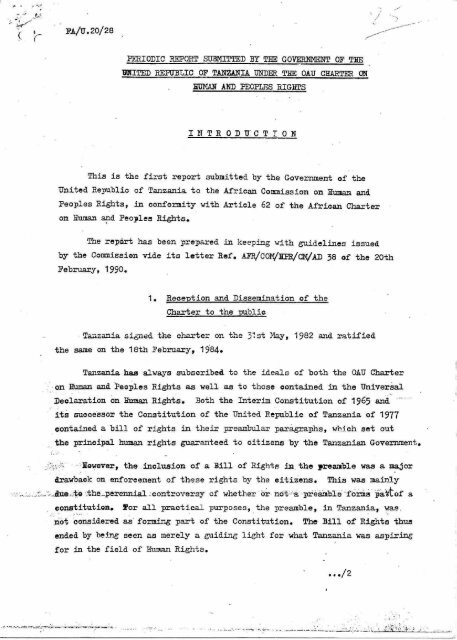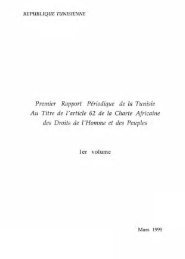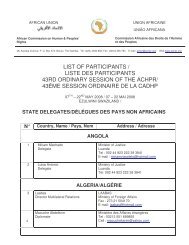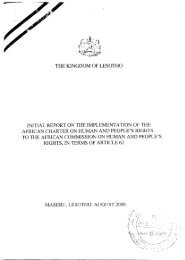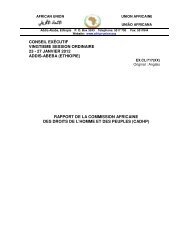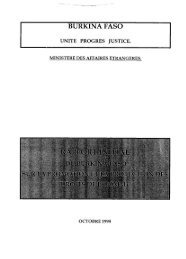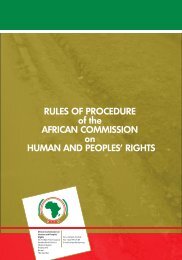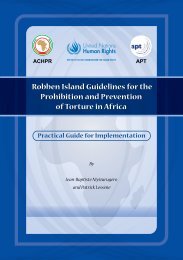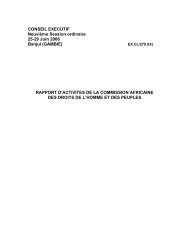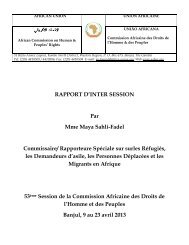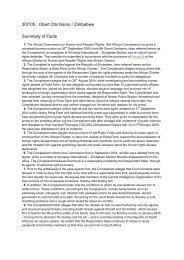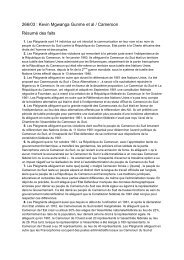This is the first report submitted by the Government of the United ...
This is the first report submitted by the Government of the United ...
This is the first report submitted by the Government of the United ...
Create successful ePaper yourself
Turn your PDF publications into a flip-book with our unique Google optimized e-Paper software.
FA/U.20/28PERIODIC REPORT SUBMITTED BY THE GOVERNMENT OF TEEDNITED REPUBLIC OF TANZANIA UNDER THE OAU CHARTER ONHUMAN AND PEOPLES RIGHTSINTRODU:CTIO N<strong>Th<strong>is</strong></strong> <strong>is</strong> <strong>the</strong> <strong>first</strong> <strong>report</strong> <strong>submitted</strong> <strong>by</strong> <strong>the</strong> <strong>Government</strong> <strong>of</strong> <strong>the</strong><strong>United</strong> Republic <strong>of</strong> Tanzania to <strong>the</strong> African Comm<strong>is</strong>sion on Human andPeoples Rights, in conformity with Article 62 <strong>of</strong> <strong>the</strong> African Charteron Yuman and Peoples Rights.The repirt has been prepared in keeping with guidelines <strong>is</strong>sued<strong>by</strong> <strong>the</strong> Comm<strong>is</strong>sion vide its letter Ref. AYR/COM/H1R/CM/AD 38 <strong>of</strong> <strong>the</strong> 20thFebruary, 1990.1. Reception and D<strong>is</strong>semination <strong>of</strong> <strong>the</strong>Charter to <strong>the</strong> publicTanzania signed <strong>the</strong> charter on <strong>the</strong> 51st May, 1982 and ratified<strong>the</strong> same on <strong>the</strong> 18th February, 1984.Tanzania has always subscribed to <strong>the</strong> ideals <strong>of</strong> both <strong>the</strong> OAU Charteron Human and Peoples Rights as well as to those contained in <strong>the</strong> UniverSalDeclaration on Haman Rights. Both <strong>the</strong> Interim Constitution <strong>of</strong> 1965 and -its successor <strong>the</strong> Constitution <strong>of</strong> <strong>the</strong> <strong>United</strong> Republic <strong>of</strong> Tanzania <strong>of</strong> 1977contained a bill <strong>of</strong> rights in <strong>the</strong>ir preambular paragraphs, which set out<strong>the</strong> principal human rights guaranteed to citizens <strong>by</strong> <strong>the</strong> Tanzanian <strong>Government</strong>.However, <strong>the</strong> inclusion <strong>of</strong> a Hill <strong>of</strong> Rights in <strong>the</strong> preamble was a majordrawback on enforcement <strong>of</strong> <strong>the</strong>se rights <strong>by</strong> <strong>the</strong> citizens. <strong>Th<strong>is</strong></strong> was mainlyJEue..to <strong>the</strong>_perennial . controversy <strong>of</strong> whe<strong>the</strong>r or nota.preambIe -fOr<strong>is</strong> pa <strong>of</strong> aconstitution. For all practical purposes, <strong>the</strong> preamble, in Tanzania, was.not considered as forming part <strong>of</strong> <strong>the</strong> Constitution. The Bill <strong>of</strong> Rights thusended <strong>by</strong> being seen as merely a guiding light for what Tanzania was aspiringfor in <strong>the</strong> field <strong>of</strong> Human Rights.
2 :In 1983, <strong>the</strong> <strong>Government</strong> <strong>of</strong> <strong>the</strong> <strong>United</strong> Republic <strong>of</strong> Tanzania madea proposal to amend <strong>the</strong> Constitution in order to incorporate <strong>the</strong> Bill<strong>of</strong> Rights as part <strong>of</strong>-<strong>the</strong> substantive body <strong>of</strong> <strong>the</strong> Constitution, ra<strong>the</strong>r--than in <strong>the</strong> preamble as hi<strong>the</strong>rto had been <strong>the</strong> case. A debate was openedand public opinion was sought through <strong>the</strong> mass media and party meetingsat all levels, where <strong>the</strong> public was given an opportunity to cement on<strong>the</strong> proposed amendments.Tanzanians all over <strong>the</strong> country responded positively, coming outwith different views and opinions as to how best human rights could besafeguarded and enforced in <strong>the</strong> <strong>United</strong> Republic <strong>of</strong> Tanzania.Finally <strong>by</strong> <strong>the</strong> Act <strong>of</strong> <strong>the</strong> Fifth Amendment to <strong>the</strong> Constitution <strong>of</strong><strong>the</strong> <strong>United</strong> Republic cf Tanzania, (Act 14.. 15 <strong>of</strong> 1984), <strong>the</strong> Bill <strong>of</strong> Rightswas incorporated into <strong>the</strong> text <strong>of</strong> <strong>the</strong> 1977 Constitution, and <strong>the</strong> act cameinto force on <strong>the</strong> 15th March, 1985.2. Leg<strong>is</strong>lative, Admin<strong>is</strong>trative and JudicialMeasures taken to effect implementation<strong>of</strong> Raman Rights and difficulties encounteredin promoting <strong>the</strong>mThe application <strong>of</strong> <strong>the</strong> Bill <strong>of</strong> Rights in <strong>the</strong> Constitution wasinitially suspended for a period <strong>of</strong> three years under Section 5 (2) <strong>of</strong><strong>the</strong> Constitution, (Consequential, Transitional and Temporary prov<strong>is</strong>ions)Act <strong>of</strong> 1984. <strong>Th<strong>is</strong></strong> period was considered as necessary in order to enable<strong>the</strong> <strong>Government</strong> to review all acts and to amend or repeal those found tobe ultra vires to <strong>the</strong> Bill <strong>of</strong> Rights in <strong>the</strong> Constitution.However, with effect from <strong>the</strong> 1st March, 1988, Tanzanians can- enforce <strong>the</strong> basic rights prov<strong>is</strong>ions contained in <strong>the</strong> Bill <strong>of</strong> Rights,<strong>by</strong> petitioning <strong>the</strong> High Court which, under section 30 (3) <strong>of</strong> <strong>the</strong>"Constitution, has excluSive original jur<strong>is</strong>diction in such proceedings.In addition to <strong>the</strong> amendments toDetention Act <strong>of</strong> 1962 has been amended<strong>the</strong> prov<strong>is</strong>ions <strong>of</strong> <strong>the</strong> Constitution andand Peoples Rights. A detainee <strong>is</strong> now<strong>the</strong> Constitution, <strong>the</strong> Preventiveto bring it more into line with<strong>the</strong> African Charter on Hamanable to petition <strong>the</strong> High Court,••.13
to challenge <strong>the</strong> legality <strong>of</strong> h<strong>is</strong> detention on any ground under section 3<strong>of</strong> <strong>the</strong> Preventive Detention Act.Fur<strong>the</strong>rmore, a detainee has to be informed <strong>of</strong> <strong>the</strong> grounds <strong>of</strong> h<strong>is</strong>detention not later than fifteen days from <strong>the</strong> date <strong>of</strong> h<strong>is</strong> detention,failure <strong>of</strong> which <strong>the</strong> detainee must be released under section 6 (1) andmust also be afforded on opportunity6(2) <strong>of</strong> <strong>the</strong> same Act. The detainee to h<strong>is</strong>• <strong>of</strong> making a written representation to <strong>the</strong> President with respectdetention.Finally, <strong>the</strong> nanes <strong>of</strong> all detainees have to be publ<strong>is</strong>hed in <strong>the</strong>Gazette, under section 6A <strong>of</strong> <strong>the</strong> Act.Amendments have also been made to <strong>the</strong> Criminal Procedure Code whichreplaced <strong>by</strong> <strong>the</strong> Criminal Procedure Act <strong>of</strong> 1985, to givewas repealed and investigatio ns.to <strong>the</strong> rights <strong>of</strong> accused persons duringgreater protectionrights do occur occasionally, only twoWhile violations <strong>of</strong> humanCourt as involving <strong>the</strong>cases have so far been cited <strong>by</strong> Judges <strong>of</strong> <strong>the</strong> Highviolation <strong>of</strong> basic rights. The major obstacle encountered in promotingority <strong>of</strong>human rights, <strong>is</strong> <strong>the</strong> low efteational level <strong>of</strong> <strong>the</strong> vast maj<strong>the</strong> rural popUlation and a lack <strong>of</strong> awareness <strong>of</strong> <strong>the</strong> basic rights <strong>of</strong>citizens. It <strong>is</strong> only a small percentage <strong>of</strong> <strong>the</strong> population living inurban areas which has an inkling <strong>of</strong> human rights and <strong>the</strong> entoreenentmechan<strong>is</strong>m in Tanzania. There <strong>is</strong> <strong>the</strong>refore, need for publIss<strong>is</strong>ingfur<strong>the</strong>r, human rights enforcement mechan<strong>is</strong>ms in Tanzania.high costs involved in instituting petitions in <strong>the</strong> HighTheCourt <strong>is</strong> a contributory factor in d<strong>is</strong>suading people from seeking redressfrom <strong>the</strong> High Court in casesinvolving<strong>the</strong> violation <strong>of</strong> basic rights.unin<strong>of</strong><strong>the</strong>3. Or<strong>is</strong>a;tior _____1a------ ndctiCourts in TanzaniaThe Legal system <strong>of</strong> Tanzania <strong>is</strong> a four tier system with <strong>the</strong>following blarachyl
4'The Court <strong>of</strong> Appeal <strong>of</strong> <strong>the</strong><strong>United</strong> Republic <strong>of</strong> TanzaniaThe High Court <strong>of</strong> <strong>the</strong> <strong>United</strong>Republic <strong>of</strong> TanzaniaD<strong>is</strong>trict and ResidentMag<strong>is</strong>trates CourtsPrimary Courts(i) The Court <strong>of</strong> Appeal <strong>of</strong> <strong>the</strong> <strong>United</strong> Republic<strong>of</strong> TanzaniaThe Court <strong>of</strong> Appeal <strong>is</strong> <strong>the</strong> supreme court <strong>of</strong> <strong>the</strong> land. It has gotonly appelate jur<strong>is</strong>diction on cases emanating from <strong>the</strong> High Court, Casesin th<strong>is</strong> court are heard <strong>by</strong> three Justices <strong>of</strong> Appeal.(ii) The HiEh Court <strong>of</strong> <strong>the</strong> <strong>United</strong> Republic<strong>of</strong> TanzaniaThe High Court has original jur<strong>is</strong>diction in cases <strong>of</strong> murder andin cases involving violations <strong>of</strong> human rights, and appelate jur<strong>is</strong>dictionin o<strong>the</strong>r instances where<strong>by</strong> appeals emanating from D<strong>is</strong>trict and ResidentMag<strong>is</strong>trates Courts are determined. Proceedings in <strong>the</strong> High Court arepresided over'<strong>by</strong> High Court Judges..../5...S.
TEE CONSTITUTION OF THE UNITED REPUBLIC OF TANZANIAThe Constitution <strong>of</strong> <strong>the</strong> <strong>United</strong> Republic <strong>of</strong> Tanzania <strong>is</strong> <strong>the</strong> basicLaw <strong>of</strong> <strong>the</strong> Land. It,establ<strong>is</strong>hes <strong>the</strong> <strong>Government</strong> <strong>of</strong> <strong>the</strong> <strong>United</strong> - Republic<strong>of</strong> Tanzania, and o<strong>the</strong>r state organs and provides for <strong>the</strong>ir powers. Theconstitution also proclaims <strong>the</strong> supremacy <strong>of</strong> <strong>the</strong> Party as well as for<strong>the</strong> establ<strong>is</strong>hment <strong>of</strong> <strong>the</strong> Judiciary and <strong>the</strong> Leg<strong>is</strong>lative branches <strong>of</strong> <strong>the</strong><strong>Government</strong>.Briefly, <strong>the</strong> Constitution <strong>is</strong> divided into ten chapters. Theseare fur<strong>the</strong>r subdivided_ into parts dealing with specific matters. Thefollowing <strong>is</strong> a rough breakdown <strong>of</strong> <strong>the</strong> constitutional prov<strong>is</strong>ions:Chapter One has three parts. The <strong>first</strong> part proclaims <strong>the</strong><strong>United</strong> Republic <strong>of</strong> Tanzania, composed <strong>of</strong> Tanzania mainland andTanzania Zanzibar, including <strong>the</strong> territorial waters <strong>the</strong>re<strong>of</strong>.<strong>Th<strong>is</strong></strong> part also declares that Tanzania <strong>is</strong> a democratic andsocial<strong>is</strong>t state with CCM being <strong>the</strong> sole political party, and finalauthority in all matters in Tanzania. Thus, all political activitywithin and concerning <strong>the</strong> <strong>United</strong> Republic <strong>of</strong> Tanzania can only beconducted under <strong>the</strong> auspices <strong>of</strong> CCM.Finally, Part One <strong>of</strong> <strong>the</strong> Constitution provides for <strong>the</strong> separation<strong>of</strong> powers between <strong>the</strong> Executive, <strong>the</strong> Judicial and <strong>the</strong> Leg<strong>is</strong>lative.branches <strong>of</strong> government.The Second part, sets out <strong>the</strong> fundamental objectives and guidingprinciples <strong>of</strong> state policy.The last part <strong>of</strong> <strong>the</strong> chapter enunciates <strong>the</strong> basic rights andduties <strong>of</strong> Tanzanians. These are basically <strong>the</strong> same as those recogn<strong>is</strong>ed<strong>by</strong> <strong>the</strong> OAU Charter on Human and Peoples Rights, and include interalia,<strong>the</strong> right to life, <strong>the</strong> right to equality, <strong>the</strong> right to freedom <strong>of</strong>conscience, <strong>the</strong> right to work as well as <strong>the</strong> duties <strong>of</strong> <strong>the</strong> individualto society.Chapter Two provides for <strong>the</strong> Executive branch <strong>of</strong> <strong>the</strong> <strong>Government</strong>.Part one deals with <strong>the</strong> President, who <strong>is</strong> both <strong>the</strong> Head <strong>of</strong> <strong>Government</strong>and Commander-in-Chief <strong>of</strong> <strong>the</strong> Defence Forces. He <strong>is</strong> vested wi<strong>the</strong>xecutive power over all union matters, as set out in <strong>the</strong> FirstSchedule to <strong>the</strong> Constitution. <strong>Th<strong>is</strong></strong> part also spells <strong>the</strong> aualifications.../2
: 2for election as President, <strong>the</strong> d<strong>is</strong>charge <strong>of</strong> <strong>Government</strong> business,Presidential powers and functions as well as <strong>the</strong> protection <strong>of</strong><strong>the</strong> President from legal proceedings in respect <strong>of</strong> anything doneor purported to be have been done whilst in <strong>of</strong>fice.Part II <strong>of</strong> th<strong>is</strong> chapter, deals with <strong>the</strong> <strong>of</strong>fices <strong>of</strong> <strong>the</strong> twoVice Presidents, <strong>the</strong> Principal Ass<strong>is</strong>tants <strong>of</strong> <strong>the</strong> President inrespect <strong>of</strong> all <strong>the</strong> affairs <strong>of</strong> Tanzania. <strong>Th<strong>is</strong></strong> provides for <strong>the</strong>manner <strong>of</strong> determining who shall be designated as <strong>the</strong> First VicePresident and Second Vice President. One <strong>of</strong> <strong>the</strong> Vice Presidents <strong>is</strong>also <strong>the</strong> President <strong>of</strong> Zanzibar while <strong>the</strong> o<strong>the</strong>r <strong>is</strong> to function as PrimeMin<strong>is</strong>ter <strong>of</strong> <strong>the</strong> mainland.Part III deals with <strong>the</strong> Office <strong>of</strong> <strong>the</strong> Prime Min<strong>is</strong>ter, <strong>the</strong>Cabinet and <strong>the</strong> <strong>Government</strong>. The Prime Min<strong>is</strong>ter <strong>is</strong> appointed <strong>by</strong> <strong>the</strong>President from amongst members <strong>of</strong> <strong>the</strong> National Assembly and hasresponsibility over <strong>the</strong> day to day running <strong>of</strong> <strong>the</strong> affairs <strong>of</strong> <strong>the</strong><strong>Government</strong>. He <strong>is</strong> also <strong>the</strong> leader <strong>of</strong> <strong>Government</strong> business in <strong>the</strong>National Assembly.The Cabinet <strong>is</strong> <strong>the</strong> principal adv<strong>is</strong>ory organ <strong>of</strong> <strong>the</strong> President.It <strong>is</strong> composed <strong>of</strong> <strong>the</strong> Vice Presidents and all <strong>the</strong> Min<strong>is</strong>ters who areappointed <strong>by</strong> <strong>the</strong> President in consultation with <strong>the</strong> Prime Min<strong>is</strong>ter.Its meetings are presided over <strong>by</strong> <strong>the</strong> President.Chapter three provides for <strong>the</strong> Leg<strong>is</strong>lature, described ascons<strong>is</strong>ting <strong>of</strong> two parts, namely <strong>the</strong> President and <strong>the</strong> Members <strong>of</strong>Paiiament. The National Assembly 4,s charged with responsibility <strong>of</strong>superv<strong>is</strong>ing and adv<strong>is</strong>ing <strong>the</strong> <strong>Government</strong> and its agencies in thlexerc<strong>is</strong>e <strong>of</strong> <strong>the</strong>ir functions.Part II <strong>of</strong> chapter three sets out <strong>the</strong> various categories <strong>of</strong><strong>the</strong> Members <strong>of</strong> <strong>the</strong> National Assembly, toge<strong>the</strong>r with <strong>the</strong> qualificationsfor Membership, and <strong>the</strong>ir tenure <strong>of</strong> <strong>of</strong>fice, as well as <strong>the</strong> proceduresfor <strong>the</strong> election <strong>of</strong> <strong>the</strong>se members.<strong>Th<strong>is</strong></strong> chapter also sets out <strong>the</strong> procedures, powers and privileges<strong>of</strong> <strong>the</strong> Parliament, including <strong>the</strong> <strong>of</strong>fices <strong>of</strong> <strong>the</strong> Speaker and DeputySpeaker and <strong>the</strong>ir roles. Fur<strong>the</strong>rmore th<strong>is</strong> part describes <strong>the</strong>procedure - in <strong>the</strong> National Assembly, <strong>the</strong> quorum needed at everysitting, as well as <strong>the</strong> mode <strong>of</strong> <strong>the</strong> exerc<strong>is</strong>e <strong>of</strong> leg<strong>is</strong>lative power.• •
Lastly, chapter three protects <strong>the</strong> freedom <strong>of</strong> speech <strong>of</strong> <strong>the</strong>Members <strong>of</strong> Parliament, in <strong>the</strong> d<strong>is</strong>charge <strong>of</strong> <strong>the</strong>ir functions.Chapter four proclaims <strong>the</strong> Revolutionary <strong>Government</strong> <strong>of</strong>Zarmibarl <strong>the</strong> Zanzibar Revolutionary Council, ,and <strong>the</strong> House•<strong>of</strong> Representative <strong>of</strong> Zanzibar. The Revolutionary <strong>Government</strong>under <strong>the</strong> President <strong>of</strong> Zanzibar, has executive authority overall matters for Tanzania Zanzibar, which are not union matters.O<strong>the</strong>r prov<strong>is</strong>ions relating to <strong>the</strong> President <strong>of</strong> Zanzibar followclosely <strong>the</strong> prov<strong>is</strong>ions relating to <strong>the</strong> Presidency <strong>of</strong> <strong>the</strong> <strong>United</strong>Republic as described under chapter 2.Part IIIcf th<strong>is</strong> chapter vests leg<strong>is</strong>lative authority inrespect <strong>of</strong> all matters in and for Tanzania Zanzibar o<strong>the</strong>r thanUnion Matters in <strong>the</strong> House <strong>of</strong> Representatives <strong>of</strong> Zanzibar. The7nion d<strong>is</strong>charges functions similar to those <strong>of</strong> <strong>the</strong> NationalAssembly <strong>of</strong> <strong>the</strong> Union <strong>Government</strong>.Chapter five <strong>of</strong> <strong>the</strong> Constitution gives prov<strong>is</strong>ion for <strong>the</strong>establ<strong>is</strong>hment <strong>of</strong> <strong>the</strong> High Court, <strong>the</strong> Judicial Services Comm<strong>is</strong>sion,<strong>the</strong> High Court <strong>of</strong> Zanzibar, <strong>the</strong> Court <strong>of</strong> Appeal <strong>of</strong> <strong>the</strong> <strong>United</strong>Republic <strong>of</strong> Tanzania and <strong>the</strong> Special Constitutional Court <strong>of</strong><strong>the</strong> <strong>United</strong> Republic.The High Courts <strong>of</strong> Tanzania and Zanzibar have unlimitedjuriddietions to hear and determine civil and criminal cases over<strong>the</strong>ir respective territories. The High Court <strong>of</strong> Tanzania mainlandalso has original jur<strong>is</strong>diction to determine eases <strong>of</strong> <strong>the</strong> abuse<strong>of</strong> basic rights provided in chapter one.,,Chapter.Pive.f_Ir<strong>the</strong>rmore, sets-out <strong>the</strong> qualifications requiredfor appointment to <strong>the</strong> Office <strong>of</strong> Judge and for <strong>the</strong> tenure <strong>of</strong> suchJudges as well as <strong>the</strong>ir age <strong>of</strong> retirement.The Court <strong>of</strong> Appeal <strong>is</strong> <strong>the</strong> supreme court <strong>of</strong> <strong>the</strong> land havingonly appelete jur<strong>is</strong>diction on eases emanating from <strong>the</strong> High Courts<strong>of</strong> Tanzania mainland and from Zanzibar. It <strong>is</strong> headed <strong>by</strong> <strong>the</strong> ChiefJustice who has overall control over <strong>the</strong> Judiciary.
'4Cases in <strong>the</strong> Court <strong>of</strong> Appeal are heard <strong>by</strong> three Justicds <strong>of</strong>Appeal who like <strong>the</strong>ir colleagues in <strong>the</strong> High Court enjoy security <strong>of</strong>tenure.Finally part vi <strong>of</strong> Chapter Five establ<strong>is</strong>hes <strong>the</strong> Special ConstitutionalCourt <strong>of</strong> <strong>the</strong> _<strong>United</strong> Republic to exerc<strong>is</strong>e'jtr<strong>is</strong>diction in hearing and Makingreconciliatory dec<strong>is</strong>ions in respect <strong>of</strong> d<strong>is</strong>putes <strong>submitted</strong> before it.Chapter Six makes prov<strong>is</strong>ions for <strong>the</strong> establ<strong>is</strong>hment, <strong>of</strong> <strong>the</strong>Permanent Comm<strong>is</strong>sion <strong>of</strong> Enquiry, <strong>the</strong> Ombudsman (PCE) and <strong>the</strong> LeadershipCode Enforcement Comm<strong>is</strong>sion. The PCE <strong>is</strong> empowered to investigate cases<strong>of</strong> m<strong>is</strong>use <strong>of</strong> power <strong>by</strong> public <strong>of</strong>ficials, while <strong>the</strong> Leadership CodeEnforcement Comm<strong>is</strong>sion <strong>is</strong> <strong>the</strong>re to ensure that leaders abide <strong>by</strong> <strong>the</strong>regulations contained in <strong>the</strong> Leadership Code.Chapter Seven contains prov<strong>is</strong>ions relating to finance, includingcontribution to and allocation from <strong>the</strong> revenue <strong>of</strong> <strong>the</strong> <strong>United</strong> Republic,as well as expenditures to be charged from <strong>the</strong> consolidated fund. TheController and Auditor-General <strong>of</strong> <strong>the</strong> <strong>United</strong> Republic <strong>of</strong> Tanzania, whoenjoys security <strong>of</strong> tenure and can only -be removed for inability tod<strong>is</strong>charge functions, after following <strong>the</strong> procedures, set out in <strong>the</strong>removal <strong>of</strong> Judges.Chapter Eight makes prov<strong>is</strong>ion for <strong>the</strong> exerc<strong>is</strong>e <strong>of</strong> peoples powerthrough Local <strong>Government</strong> Authorities and Local Councils,'Chapter Nine provides for <strong>the</strong> Armed Forces and <strong>the</strong> powers <strong>of</strong> <strong>the</strong>Commander-in-Chief. It also prohibits <strong>the</strong> establ<strong>is</strong>hment <strong>of</strong> irregularforces in Tan7Lnia.Lastly, Chapter Ten contains <strong>the</strong> m<strong>is</strong>cellaneous prov<strong>is</strong>ionsincluding <strong>the</strong> First Schedule which . pecifies Union matters <strong>of</strong> <strong>the</strong><strong>United</strong> Republic <strong>of</strong> Tanzania. These include interalia, mattersrelating to <strong>the</strong> Constitution, External Affairs, Defence and Seautly,<strong>the</strong> Police, Emergency powers, External Trade anti. Borrowing, currencymatters, mineral oil resources and <strong>the</strong> Court <strong>of</strong> Appeal <strong>of</strong> <strong>the</strong><strong>United</strong> Republic <strong>of</strong> Tanzania.
• 5 •(iii) The D<strong>is</strong>trict and Resident Mag<strong>is</strong>tratesCourtsD<strong>is</strong>trict and Resident Mag<strong>is</strong>trates Courts have both original aswell as appelate jur<strong>is</strong>diction over cases from Primary Courts. Thesecourts are-presided_over'<strong>by</strong> D<strong>is</strong>tri,A-Mag<strong>is</strong>trates andAtesidmatlUestrates-respectively.
t o: 6 :d<strong>is</strong>ciplining and d<strong>is</strong>m<strong>is</strong>sal <strong>of</strong> D<strong>is</strong>trict and Resident Mag<strong>is</strong>trates undersection 112(1), as well as for <strong>the</strong> Organ<strong>is</strong>ation and functioning <strong>of</strong> <strong>the</strong>various courts.On <strong>the</strong> o<strong>the</strong>r hand, Pimary Courts are co7;obrolled <strong>by</strong> <strong>the</strong> JudicialServices Special Comm<strong>is</strong>sion4;O<strong>the</strong>r texts guiding <strong>the</strong> operations <strong>of</strong> <strong>the</strong> courts are as follows:(i) The Mag<strong>is</strong>trates Courts Act 1984(ii) The AlTelate Jur<strong>is</strong>diction Act 1979(iii( The High Court Rules(iv) The Crimin;,1 Procedure Code(v) The Penal Code(vi) The Civil Procedure Code(vii) The ivocates OrdinancePrimary Courts Prov<strong>is</strong>ions relating to Civil Jur<strong>is</strong>diction <strong>of</strong>Primary Courts, 1963(ix) Primary Court prov<strong>is</strong>ions relating to criminal jur<strong>is</strong>diction <strong>of</strong>Primary Courts, 1963.5. The Status <strong>of</strong> <strong>the</strong> Judiciary in TanzaniaThere <strong>is</strong> a clear separation <strong>of</strong> powers between <strong>the</strong> Executive,Leg<strong>is</strong>lature and <strong>the</strong> Judiciary in Tanzania, under section 4 (1) <strong>of</strong> <strong>the</strong>Constitution. Though not expressly spelt out in <strong>the</strong> Constitution, <strong>the</strong>judiciary <strong>is</strong> independent in <strong>the</strong> d<strong>is</strong>charge <strong>of</strong> judicial functions.The independence <strong>of</strong> <strong>the</strong> judiciary <strong>is</strong> guaranteed through <strong>the</strong>security <strong>of</strong> tenure <strong>of</strong> judges which <strong>is</strong> entrenched in <strong>the</strong> Constitution.Under section 109 (2), Judges are appointed <strong>by</strong> <strong>the</strong> President in consultationwith <strong>the</strong> Chief Justice <strong>of</strong> <strong>the</strong> Court <strong>of</strong> Appeal. However once appointed,0,:judge_cannot.be removed from <strong>of</strong>ficeuntil,reaahing'<strong>the</strong>:age'Of retirement,save for inability to perform h<strong>is</strong> functions or for m<strong>is</strong>behaviour.Where <strong>the</strong> question <strong>of</strong> removing a Judge from <strong>of</strong>fice ar<strong>is</strong>es, anelaborate procedure set out in section 110 (6) must'be- -followed. Underthat section, <strong>the</strong> President must set up a Comm<strong>is</strong>sion whose Chairman andat least half <strong>of</strong> <strong>the</strong> members should be persons holding <strong>the</strong> <strong>of</strong>fice <strong>of</strong>Judge <strong>of</strong> <strong>the</strong> High CourT, or <strong>the</strong> Court <strong>of</strong> Appeal <strong>of</strong> a Commonwealth country,7. •
: 7to investigate <strong>the</strong> matter, and <strong>report</strong> its findings to <strong>the</strong> President.It <strong>is</strong> only after <strong>the</strong> Comm<strong>is</strong>sion has adv<strong>is</strong>ed that a Judge be removedafter investigation that <strong>the</strong> President can proceed and reMC%iv him from<strong>of</strong>fice..Pur<strong>the</strong>rmorei,.,<strong>the</strong> emoluments <strong>of</strong> Judgesarecharged•fronc<strong>the</strong>- -consolidated fund, and are <strong>the</strong>refore not <strong>the</strong> subject <strong>of</strong> debate <strong>by</strong>'Parliament every year.At a lower level, D<strong>is</strong>trict and Resident Mag<strong>is</strong>trates fall under<strong>the</strong> Judicial Services Comm<strong>is</strong>sion, composed <strong>of</strong> <strong>the</strong> Chief JI)stice who <strong>is</strong>Chairman <strong>of</strong> <strong>the</strong> Comm<strong>is</strong>sion, a Judge <strong>of</strong> <strong>the</strong> court at Appeal, and <strong>the</strong>twn n"•-appointed <strong>by</strong> <strong>the</strong> President. The Judicial ServicesComm<strong>is</strong>sion <strong>is</strong> responsible for <strong>the</strong> appointment, d<strong>is</strong>cipline and d<strong>is</strong>m<strong>is</strong>sal<strong>of</strong> mac'. mag<strong>is</strong>trates.These measures go a long way to ensure that court dec<strong>is</strong>ions arebased tirely on <strong>the</strong> evidence adduced in court, and are not influenced<strong>by</strong> eit_er <strong>the</strong> Executive <strong>of</strong> Leg<strong>is</strong>lative branch <strong>of</strong> <strong>Government</strong>.Please find enclosed herewith a brief commentary on <strong>the</strong>Constitution <strong>of</strong> <strong>the</strong> <strong>United</strong> Republic <strong>of</strong> Tanzania*o.c: MPAHon. Judge R.H. K<strong>is</strong>anga - Court <strong>of</strong> Appeal.


